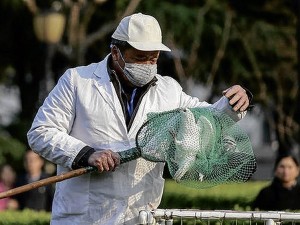The bird flu scare

SCIENTISTS around the world have praised China for its handling of the deadly outbreak, including random sampling of birds for presence of the H7N9 virus. AFP
The ongoing spread of A (H7N9), a mutated bird flu virus that has made its jump from animals to humans and which so far killed nine individuals out of 33 confirmed cases in China, should warrant high vigilance.
The H7N9 strain is a form of avian flu not previously found in humans and is distinct from the H5N1 bird flu virus that has caused more than 360 deaths worldwide since it was found in humans in 2003.
Although experts still do not know with certainty the source of the H7N9 infection, there is no evidence of sustained human-to-human transmission according to the World Health Organization.
However, this alarming news should remind about the interesting nature of various flu viruses, how they mutate constantly and why taking the annual flu shot is necessary to prevent their further spread.
In the case of the seasonal flu, the shot given each year contains the flu virus strain from each type (usually three) that is expected to cause the flu within that particular year.
Taxing
While most people who get the flu will have mild illness—and will recover in less than two weeks—for some, battling flu could be taxing to their immune system and even increase their chances of developing pneumonia, one of the more severe and often fatal complications of the disease.
Some of the patients have died of severe pneumonia brought on by the H7N9 virus.
Pneumonia can strike people of any age, but it is of greatest risk to the elderly, very young children and persons with chronic illnesses like asthma, chronic obstructive pulmonary disease, congenital heart disease or those with diabetes.
And aside from pneumonia, these high-risk individuals are also prone to contracting other complications such as sinusitis (sinus infections), bronchitis, muscle inflammation (myositis), central nervous system disease, as well as heart problems including heart attacks, inflammation of the heart muscle (myocarditis), or even inflammation of the sac around the heart (pericarditis).
That is why this early experts have been recommending taking the shot as flu infection is notoriously hard to predict. Even if its peak season is expected to begin in June or July, it could come much earlier and catch a number of these high-risk individuals off guard.
Moreover, even if it’s not yet the peak of infection rates, a person who is already sick could effectively infect others around him within a two-meter radius by expelling droplets and fine particles (through talking, coughing or sneezing) that could remain suspended in the air for some time.
These droplets or fine particles with flu virus could directly land in the mouths or noses of people or be inhaled into the lungs. In a lot of cases these could also land on surfaces or objects that other people will eventually touch or hold.
To lessen the chances of spreading the flu, the United States Centers for Disease Control and Prevention advises people to stay away from the sick and those who are already sick to stay home.
It also is important for one to wash hands with soap and water. If soap and water are not available, the use of an an alcohol-based gel is recommended. Utensils, dishes and glasses belonging to those who are sick should not be shared without thoroughly washing them first.
Cleaned
Moreover, frequently touched surfaces like phone handset, computer keyboard and door handles should be cleaned and disinfected regularly, especially if someone in the area is already showing symptoms.
Here is another important reminder: Getting the flu shot is as important for the community as for you. Called herd immunity or the protection of the weak and vulnerable, these individuals will be able to enjoy better protection when enough of the people around them are vaccinated.
Indeed, while having yourself vaccinated greatly increases the odds that you won’t get sick with flu this year, you are also protecting everyone you come into contact with: your parents, the new baby in the family, the stranger on the bus who can’t get vaccinated, and everyone else who is not able to withstand a flu infection as well as you.














